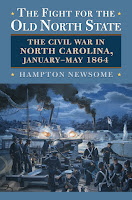Chapter 4 of of The Fight for the Old North State goes into detail about Grant's proposal, which, by coincidence, was prepared only days before the Confederates
attacked New Bern, initiating their own offensive in the state.
Maj. Gen. H. W. Halleck,
General-in- Chief of the Army, Washington, D. C.:
General:
I would respectfully suggest whether an abandonment of all previously
attempted lines to Richmond is not advisable, and in lieu of these one
be taken farther south. I would suggest Raleigh, N. C, as the objective
point and Suffolk as the starting point. Raleigh once secured, I would
make New Berne the base of supplies until Wilmington is secured.
A moving force of 60,000
men would probably be required to start on such an expedition. This
force would not have to be increased unless Lee should
withdraw from his present position. In that case the necessity for so
large a force on the Potomac would not exist. A force moving from
Suffolk would destroy first all the roads about Weldon, or even as far
north as Hicksford. From Weldon to Raleigh they would scarcely meet with
serious opposition. Once there, the most interior line of railway still
left to the enemy, in fact the only one they would then have, would be
so threatened as to force him to use a large portion of his army in
guarding it.
This would virtually force an evacuation of Virginia and
indirectly of East Tennessee. It would throw our armies into new fields,
where they could partially live upon the country and would reduce the
stores of the enemy. It would cause thousands of the North Carolina
troops to desert and return to their homes.
It would give us possession of many negroes who are now indirectly aiding the rebellion. It would draw the enemy from campaigns of their own choosing, and for which they are prepared, to new lines of operations never expected to become necessary. It would effectually blockade Wilmington, the port now of more value to the enemy than all the balance of their sea-coast. It would enable operations to commence at once by removing the war to a more southern climate, instead of months of inactivity in winter quarters. Other advantages might be cited which would be likely to grow out of this plan, but these are enough.
From your better opportunities of studying the country and the armies that would be involved in this plan, you will be better able to judge of the practicability of it than I possibly can. I have written this in accordance with what I understand to be an invitation from you to express my views about military operations, and not to insist that any plan of mine should be carried out. Whatever course is agreed upon, I shall always believe is at least intended for the best, and until fully tested will hope to have it prove so.
I am, general, very respectfully, your obedient servant, |
It would give us possession of many negroes who are now indirectly aiding the rebellion. It would draw the enemy from campaigns of their own choosing, and for which they are prepared, to new lines of operations never expected to become necessary. It would effectually blockade Wilmington, the port now of more value to the enemy than all the balance of their sea-coast. It would enable operations to commence at once by removing the war to a more southern climate, instead of months of inactivity in winter quarters. Other advantages might be cited which would be likely to grow out of this plan, but these are enough.
From your better opportunities of studying the country and the armies that would be involved in this plan, you will be better able to judge of the practicability of it than I possibly can. I have written this in accordance with what I understand to be an invitation from you to express my views about military operations, and not to insist that any plan of mine should be carried out. Whatever course is agreed upon, I shall always believe is at least intended for the best, and until fully tested will hope to have it prove so.
U. S. GRANT,
Major- General[O.R.A. 33:394-395]






